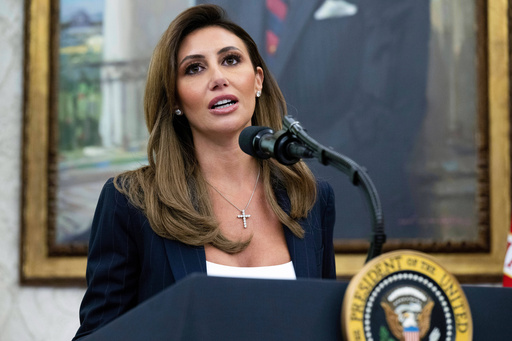PHILADELPHIA
By MIKE CATALINIAssociated Press
A federal appeals court is set to hear arguments over whether President Donald Trump’s former lawyer, Alina Habba, has been unlawfully serving as the top federal prosecutor in New Jersey since earlier this year. The 3rd Circuit Court of Appeals has scheduled a hearing in Philadelphia over Habba’s appointment, which a lower court judge said in August was done with a “novel series of legal and personnel moves” and that she was not lawfully serving in the as U.S attorney for New Jersey. The judge’s order said that her actions could be declared void but put his order on hold pending appeal.
PHILADELPHIA (AP) — A federal appeals court is set to hear arguments Monday over whether President Donald Trump's former lawyer, Alina Habba, has been unlawfully serving as the top federal prosecutor in New Jersey since earlier this year.
The 3rd Circuit Court of Appeals has scheduled a hearing in Philadelphia over Habba's appointment, which a lower court judge said in August was done with a “novel series of legal and personnel moves” and that she was not lawfully serving as U.S attorney for New Jersey.
The judge's order said that her actions since July could be declared void but put his order on hold so the U.S. Justice Department could appeal.
Habba is validly serving in the role under a federal statute that permits the first assistant attorney, a post she was appointed to by the Trump administration, the government said in court briefs ahead of Monday's hearing.
A similar dynamic is playing out in Nevada, where a federal judge disqualified the administration's pick to be U.S. attorney there.
In the Habba case, U.S. District Judge Matthew Brann's decision came after several people charged with federal crimes in New Jersey challenged the legality of Habba’s tenure. They sought to block the charges, arguing she didn’t have the authority to prosecute their cases after her 120-day term as interim U.S. attorney expired.
Habba was Trump's attorney in criminal and civil proceedings before he was elected to a second term. She served as a White House adviser briefly before Trump named her as a federal prosecutor in March.
Shortly after her appointment, she said in an interview she hoped to help “turn New Jersey red,” a rare overt political expression from a prosecutor, and said she planned to investigate the state’s Democratic governor and attorney general.
She then brought a trespassing charge, eventually dropped, against Newark Mayor Ras Baraka stemming from his visit to a federal immigration detention center.
Habba later charged Democratic U.S. Rep. LaMonica McIver with assault stemming from the same incident, a rare federal criminal case against a sitting member of Congress other than for corruption. McIver denied the charges and pleaded not guilty. The case is pending.
Questions about whether Habba would continue in the job arose in July when her temporary appointment was ending and it became clear New Jersey’s two Democratic U.S. senators, Cory Booker and Andy Kim, would not back her appointment.
With her appointment expiring, federal judges in New Jersey exercised their power under the law to replace Habba with a career prosecutor who had served as her second in-command.
U.S. Attorney General Pam Bondi then fired the prosecutor installed by the judges and renamed Habba as acting U.S. attorney. The Justice Department said the judges acted prematurely and said Trump had the authority to appoint his preferred candidate to enforce federal laws in the state.
Brann’s ruling said the president’s appointments are still subject to the time limits and power-sharing rules laid out in federal law.


